Despite candidates and parties bribe voters and misuse administrative resources less than in 2012[1], the reported incidents show that many candidates are ready to gain the victory by illegal means. OPORA has already detected [2]63 incidents having features of voter bribery and 35 incidents characterized as misuse of administrative resources during the official election process. As long as the Verkhovna Rada of Ukraine adopted amendments to the Criminal Code of Ukraine related to strengthening liability for violation of citizen voting rights only in the end of election campaign (10/14/2014), candidates can avoid responsibility for violations that are already committed. Thus, OPORA calls the President of Ukraine to urgently sign amendments to the Criminal Code in order to prevent violations on the last days of campaign, the voting day, during vote tabulation, and determination of election results in districts.
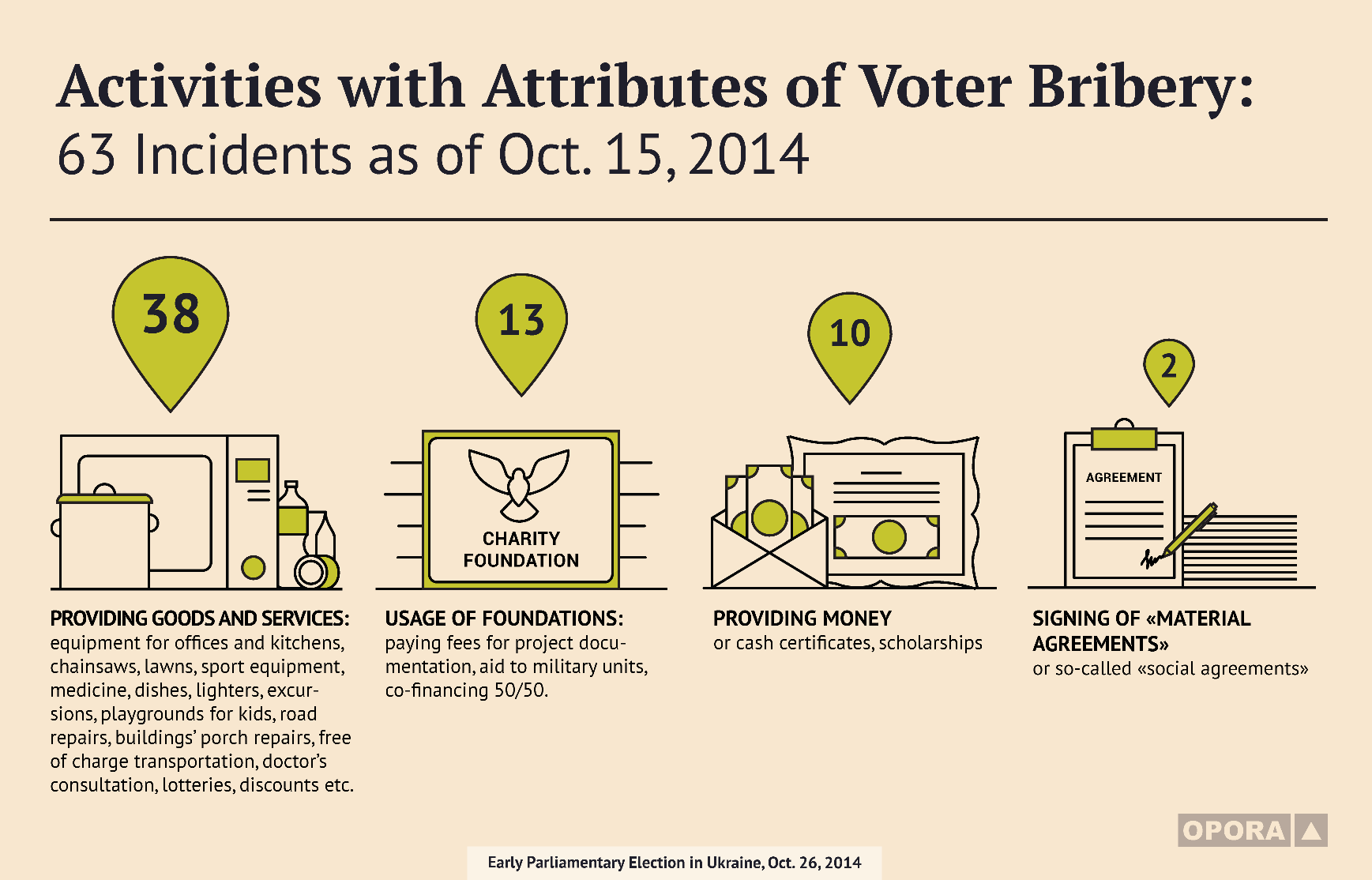
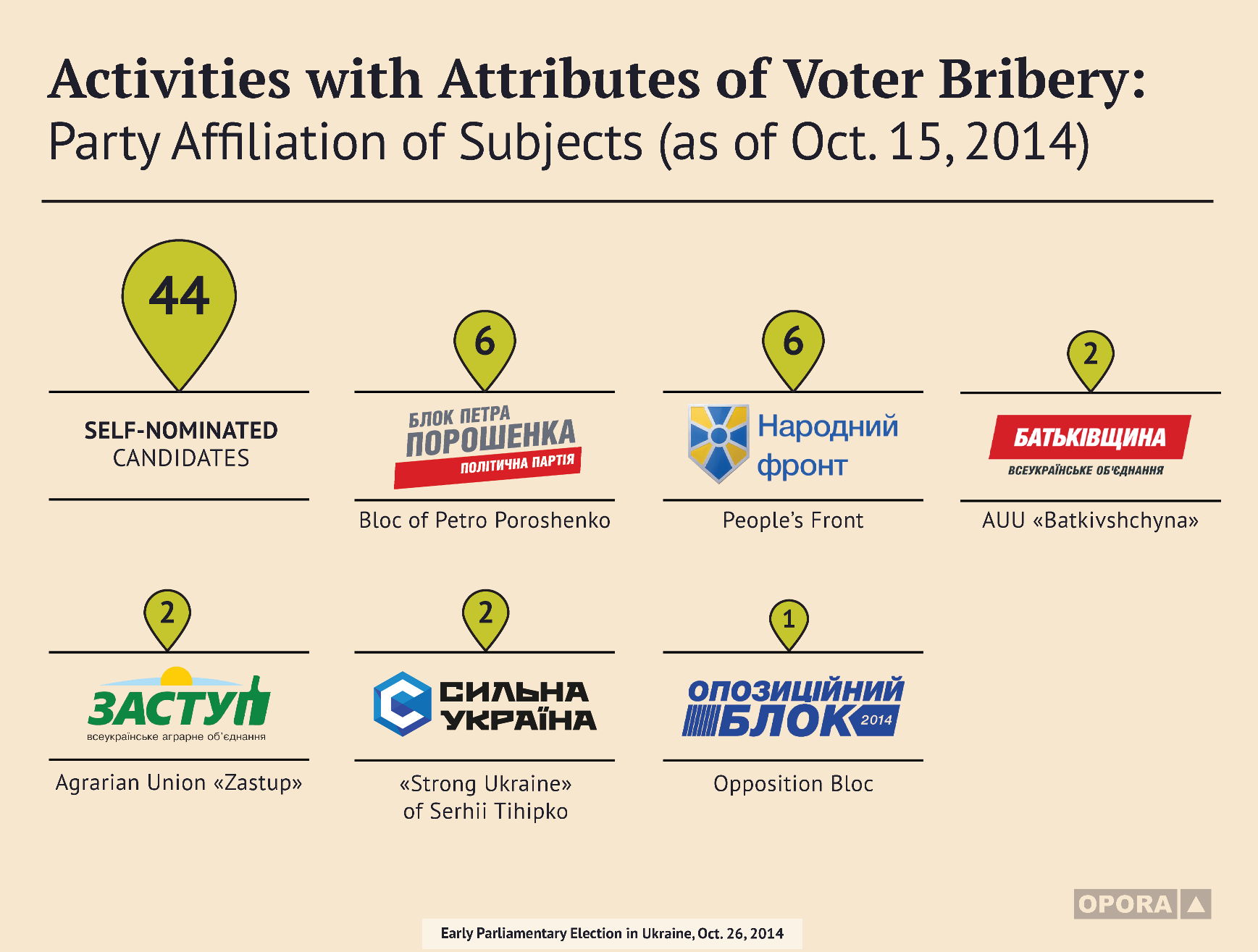
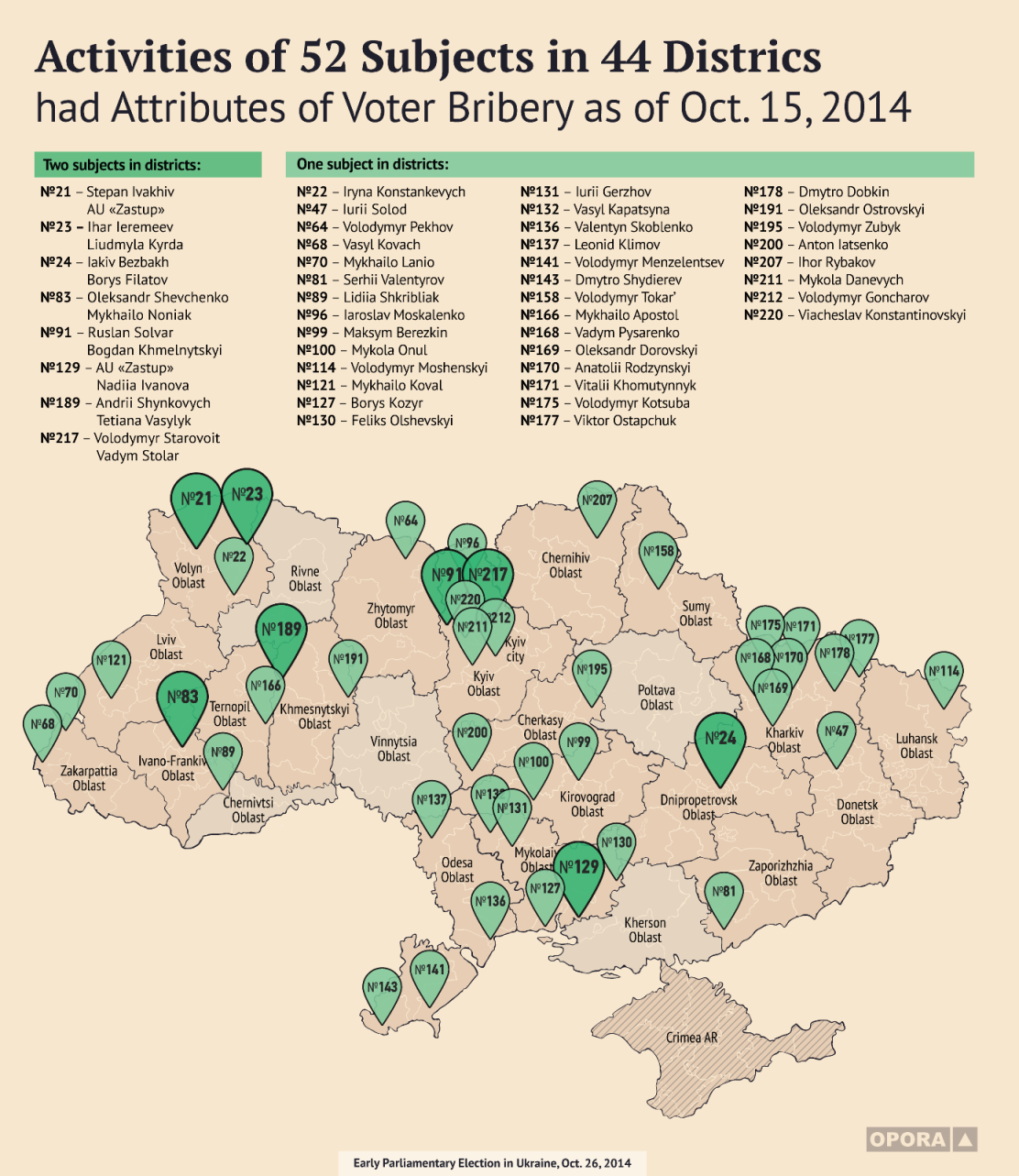
Information about electoral violations is available on the interactive Map of violations "2014 Parliamentary elections" (map.oporaua.org) updated in real-time. Besides that, active citizens may call OPORA's hotline at (044)221-44-06 or (094)821-44-06 and receive a consultation concerning protection of voting rights.
Electoral and Parliamentary Programs Coordinator at Civil Network OPORA Olha Aivazovska stated: "Characteristics of voter bribery were noticed in campaigning efforts of 52 electoral subjects (candidates and parties in 44 of 213 single-mandate districts. Almost 70% of violations related to the voter bribery were noticed in activities of self-nominated candidates. However, candidates nominated by the Petro Poroshenko Bloc (6 incidents), the People's Front (6), AUU Batkivshchyna (2), the All-Ukrainian Agrarian Union Zastup (2), the Strong Ukraine party of Serhii Tihipko (2), the Opposition Bloc (1) were rarely noticed in incidents related to voter bribery."
The most popular method of voter bribery was dissemination of preferential or free goods and services (38 of 63 incidents). The use of charitable funds in campaigning purposes (13 incidents) and providing the money to the voters by candidates and parties as a part of campaign or in other way (10 incidents) are another two widespread types of voter bribery. The most resonant incident was when the voters received 500 UAH for, allegedly, dissemination of one copy of campaigning newspaper of the All-Ukrainian Agrarian Union Zastup.
Although misuse of administrative resource is not systematic in these Parliamentary elections, some high and local officials do violate the law by abusing their powers. Most candidates violated the prohibition of campaigning on official events, organized by government bodies, local self-government bodies, state or communal enterprises, establishments, institutions, and organizations (20 incidents).
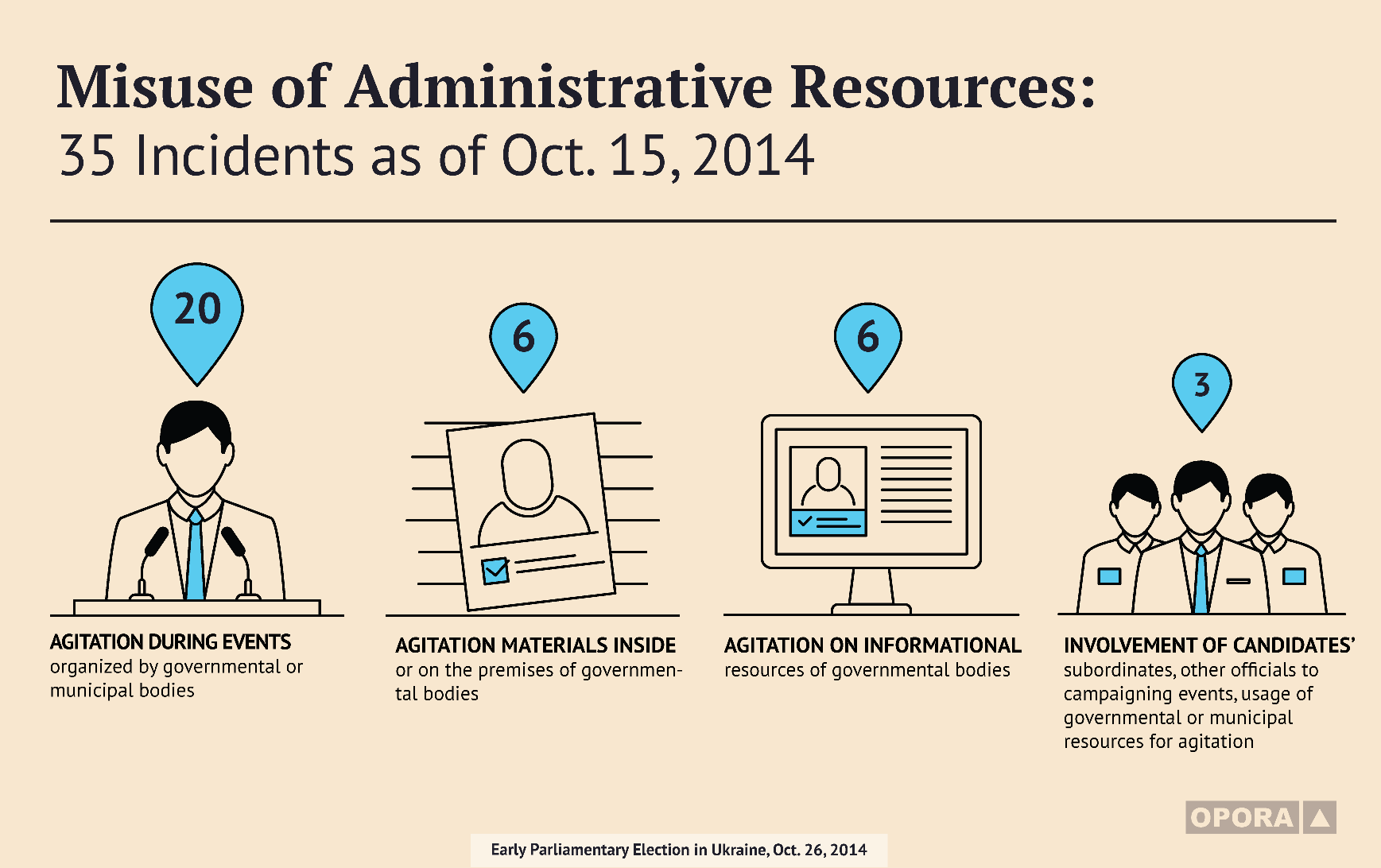
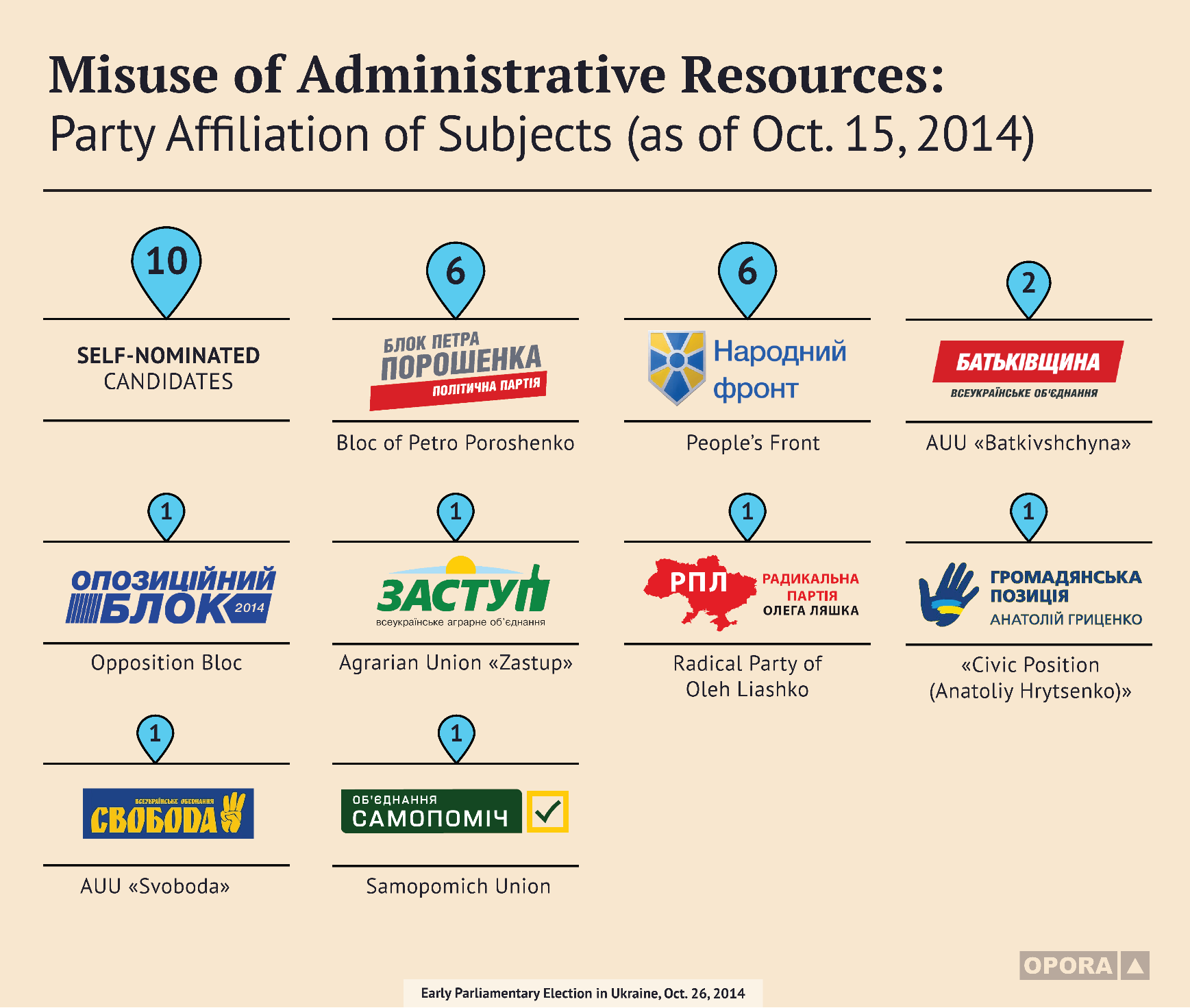
Oleksandr Kliuzhev, OPORA's analyst, denotes: "OPORA have already detected 35 incidents characterized as misuse of administrative resources in this election campaign. Self-nominated candidates misused the administrative resource the most often (10 incidents, what is almost 30%). Representatives of the Petro Poroshenko Bloc and the People's Front were involved in 6 violations related to the misuse of administrative resource. The AUU Svoboda, the Opposition Bloc, the All-Ukrainian Agrarian Union Zastup, the Civic Position (Anatolii Hrytsenko), and the Radical Party of Oleh Liashko were involved only in one incident.
The following candidates were campaigning on official events of government bodies: the Minister of Infrastructure of Ukraine Maksym Burbak (SMD #204, Chernivtsi obl., the People's Front), the Minister of Education and Science Serhii Kvit (included in party list of the Petro Poroshenko Bloc), Deputy Minister of Foreign Affairs of Ukraine Danylo Lubkivskyi (SMD #118, Lviv obl., self-nominated). These violations involve mostly regional and local officials. As for other violations, observers reported that campaign materials were noticed inside or outside the premises of government bodies, state or communal institutions (6 incidents), as well as campaigning was noticed on information resources of government bodies at all levels (6 incidents). In 3 incidents, candidates, who are public officials now, attracted their subordinates or other public officials to campaigning efforts.
OPORA calls the President of Ukraine to urgently sign amendments to the Criminal Code of Ukraine in order to prevent violations on the last days of campaign, the voting day, during vote tabulation, and determination of election results in districts.
Precinct election commissions were formed without major violations and within time constraints established by the law. Organization of the election process in Donetsk and Luhansk oblasts is stably complicated. The PECs are still not formed in some districts due to the constant armed aggression of pro-Russian terrorist groups. As of 14 October, only 7 of 21 DECs in Donetsk oblast finished creation of PECs (DECs #46, 47, 48, 50 57, 58, 59). However, 9 districts of the region (#41-44, 51, 54, 55, 56, and 61) are controlled by illegal groups, and it's impossible to observe the formation of PECs there. In Luhansk oblast, 6 of 11 DECs (#104, 106, 107, 112, 113, and 114) have finished a little delayed formation of PECs. With the exception of some incidents (in Dnipropetrovsk, Zhytomyr, Lviv, and Kharkiv oblasts), DECs didn't hinder legitimate activities of civic observers. In general, procedural violations and abuses, reported by observers of Civil Network OPORA, were not systematic or planned.
REPORT ON VOTER BRIBERY AND MISUSE OF ADMINISTRATIVE RESOURCES IN EARLY PARLIAMENTARY ELECTIONS IN UKRAINE
For comment, please contact:[2] Data as of 10/15/2014. However, we didn't take into consideration misuses committed by de-facto candidates that are not registered in the CEC yet. Incidents reported before the official registration of candidates, as well as all violations during the election process are available for your consideration on the Map of violations at http://map.oporaua.org/ OPORA calls the MIA of Ukraine to take the corresponding legal measures in response to information published by the organization on this resource.. The information is updated daily.